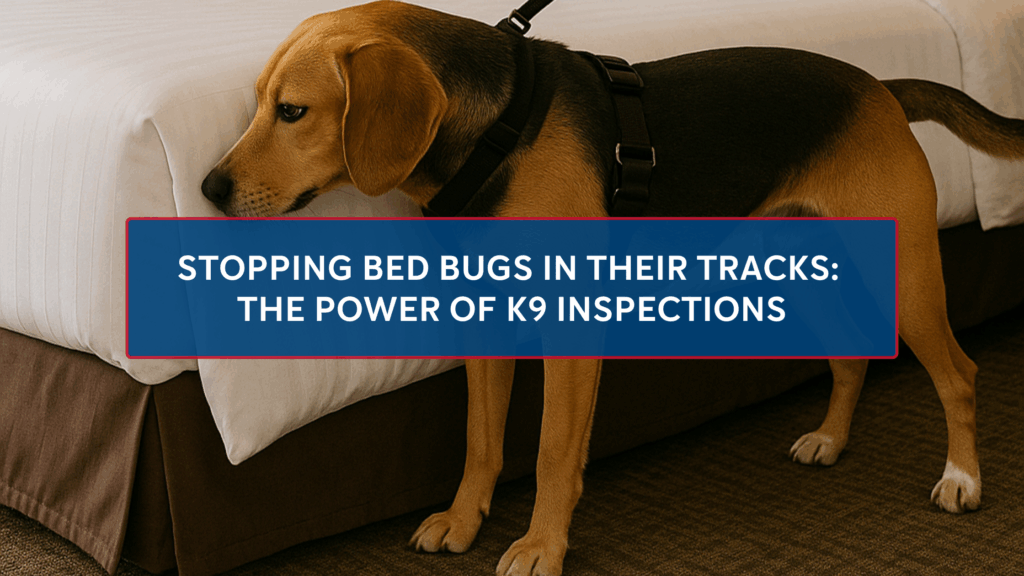Fleas are often associated with pets and homes, but they can be just as problematic—and disruptive—in commercial spaces. Whether you’re managing a healthcare facility, office, pet service business, or hospitality venue, understanding the risks and prevention strategies for flea infestations is critical to protecting your customers, employees, and brand.
This guide breaks down how fleas operate, why they pose a threat in business environments, and what steps you can take to keep your commercial property protected year-round.
Flea Biology 101: What Every Business Should Know
Fleas are small, wingless insects that survive by feeding on the blood of mammals and birds. The most common species found in the U.S. is the cat flea, which can infest animals and indoor environments alike.
A flea’s lifecycle includes four stages: egg, larva, pupa, and adult. Under the right conditions, fleas can go from egg to adult in as little as three weeks, making infestations difficult to catch early—and even harder to eliminate if left untreated. One adult flea can lay up to 50 eggs per day, and these tiny white specks often fall off hosts and settle into carpets, furniture, or cracks in the floor.
Why Fleas Are a Serious Concern for Businesses
A flea infestation isn’t just a nuisance—it can have real consequences for your business, especially in industries where cleanliness and customer comfort are paramount. Here’s why:
- Health Risks: Flea bites can cause itching, allergic reactions, and in some cases, spread parasites like tapeworms.
- Employee Discomfort: Bites can distract or distress employees, especially those with allergies or sensitivities.
- Reputation Damage: Customers who encounter pests—even a single flea—may leave negative reviews or take their business elsewhere.
- Recurring Problems: Without proper treatment, fleas can continue to re-emerge due to their lifecycle and adaptability.
Common Entry Points and High-Risk Commercial Environments
Fleas often find their way into businesses via foot traffic, pets, packages, or employees’ clothing. Even if your business doesn’t allow pets, fleas can still be introduced indirectly.
Industries at higher risk include:
- Veterinary clinics and grooming salons
- Pet-friendly workplaces or hotels
- Childcare centers and schools
- Healthcare or assisted living facilities
- Multi-tenant office buildings and shared spaces
Signs of Flea Activity in a Commercial Property
Not sure if you have a flea problem? Look for these warning signs:
- Unexplained bites—typically around ankles and legs
- Fleas jumping or crawling on floors, furniture, or in carpeting
- Scratching behavior from office pets or service animals
- Pepper-like flea dirt on upholstery or bedding
Because fleas are tiny and fast-moving, infestations are often well underway before they’re spotted. That’s why early intervention is key.
Proactive Prevention Strategies
The best way to fight fleas is to stop them before they spread. Here are a few practical ways to keep your space flea-free:
- Vacuum regularly, especially in carpeted areas, break rooms, and around baseboards.
- Clean and sanitize common areas where people congregate or sit for extended periods.
- Schedule routine inspections with a licensed pest control provider.
- Educate staff on reporting potential pest activity early.
- Maintain outdoor landscaping to limit flea harborages near entry points.
Professional Treatment and Long-Term Control
If fleas are already present, professional pest control is essential. DIY treatments often miss hidden eggs or larvae and fail to break the flea life cycle. Commercial flea treatments typically include:
- Targeted applications to affected areas (both interior and exterior)
- Follow-up inspections to monitor and prevent reinfestation
- Recommendations for cleaning protocols and preventive maintenance
A professional provider will also help you implement treatment plans with minimal disruption to business operations.
The Value of Integrated Pest Management (IPM)
For long-term success, consider a proactive, eco-conscious approach like Integrated Pest Management (IPM). This strategy combines prevention, monitoring, and minimal chemical use to create a healthier and more effective pest control plan.
A trusted pest management partner will tailor an IPM approach to your specific facility and industry—ensuring your space stays flea-free without sacrificing comfort, safety, or productivity.
Protect Your Business from Flea-Related Risks
Fleas may be small, but the damage they can cause to your business reputation, customer satisfaction, and employee comfort is anything but. Whether you’re looking to prevent future infestations or respond to a current concern, the key is acting quickly and partnering with experts who understand the unique demands of commercial environments.
Need help protecting your space from fleas and other summer pests? Contact our commercial pest control team at 800-225-5305 to schedule an inspection or learn more about tailored prevention plans.



